NUR2203 Assignment 1: Post-Operative Care of Knee Replacement Patient
VerifiedAdded on 2022/11/09
|12
|2895
|213
Report
AI Summary
This nursing assignment focuses on the post-operative care of a 76-year-old man who underwent a right total knee replacement. It begins with an introduction to post-operative care, emphasizing the importance of a comprehensive care plan to prevent complications. Part A details the patient's condition, including altered vital signs and medications, and discusses the clinical issues of infection risk, impaired physical mobility, and acute pain, along with relevant nursing interventions and rationales. Part B addresses the impact of smoking in the post-operative period, particularly the risks associated with anesthesia, hypertension, cardiovascular problems, and obstructive sleep apnea. It highlights the crucial role of nursing interventions in monitoring, educating, and preventing further deterioration. Part C outlines the discharge plan, including medication management, activities of daily living, physical therapy, diet, and psychological support. The conclusion summarizes the significance of a well-structured care plan in minimizing post-operative complications and promoting patient recovery. This report demonstrates the application of nursing knowledge, clinical decision-making, and evidence-based practice in the care of a surgical patient.
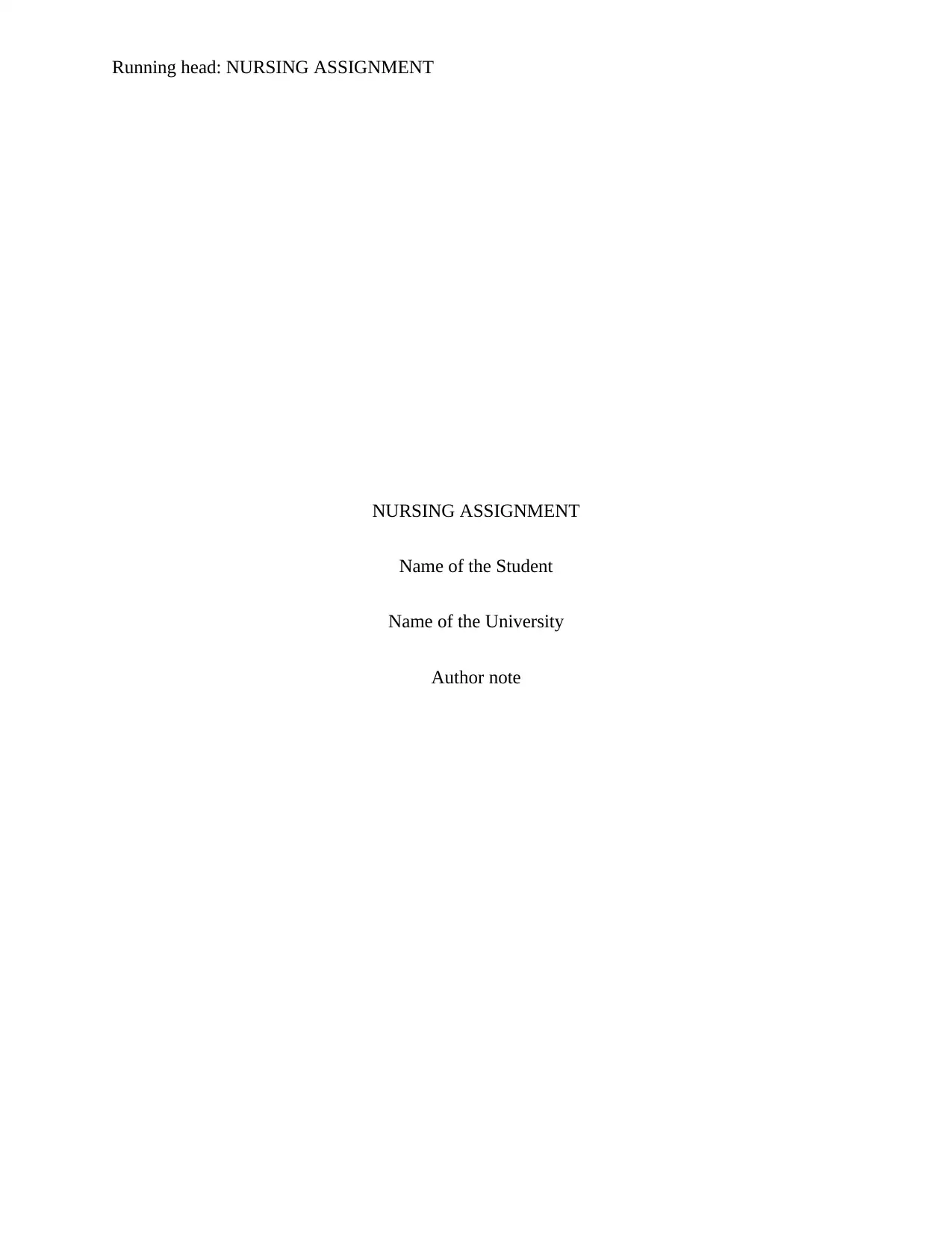
Running head: NURSING ASSIGNMENT
NURSING ASSIGNMENT
Name of the Student
Name of the University
Author note
NURSING ASSIGNMENT
Name of the Student
Name of the University
Author note
Paraphrase This Document
Need a fresh take? Get an instant paraphrase of this document with our AI Paraphraser
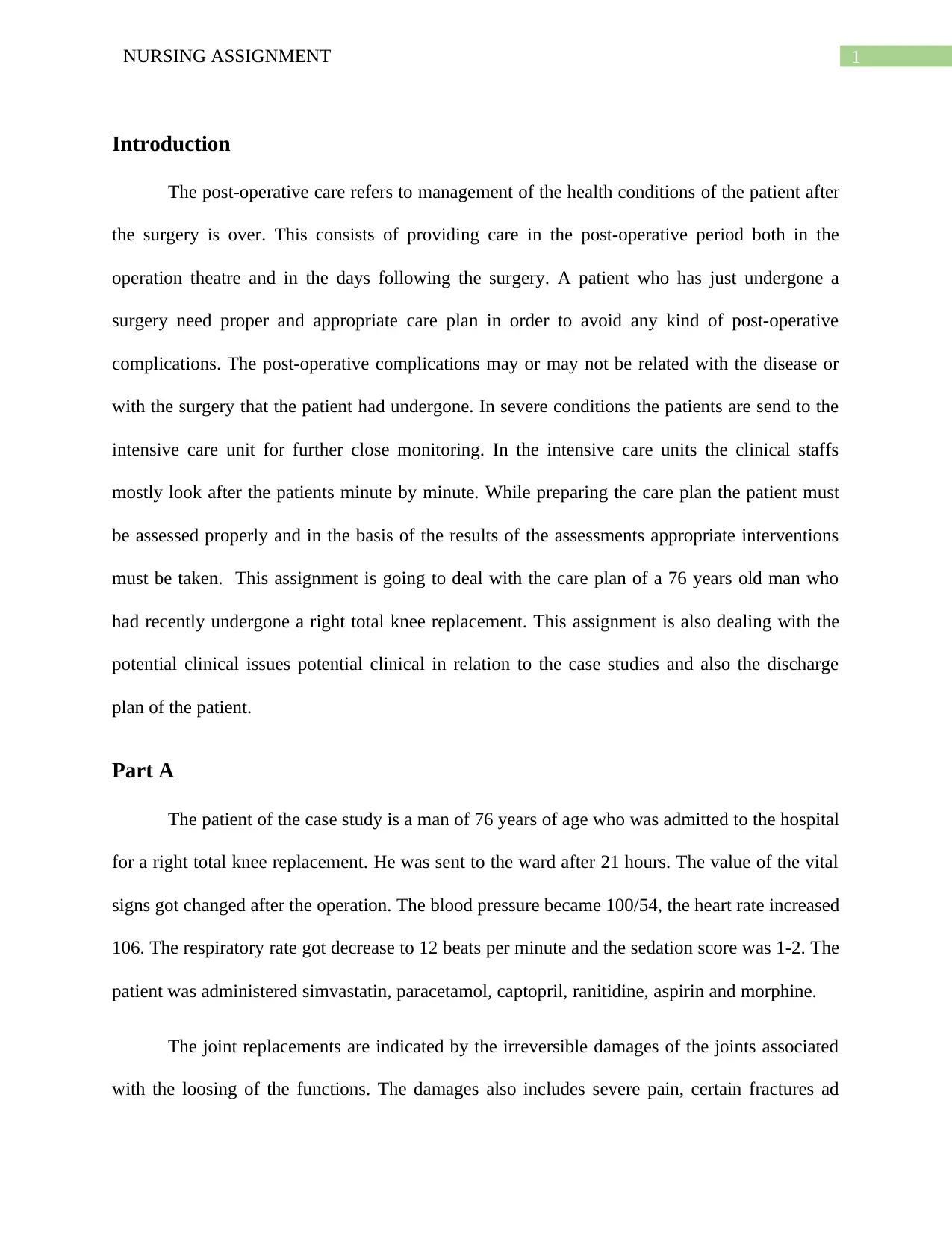
1NURSING ASSIGNMENT
Introduction
The post-operative care refers to management of the health conditions of the patient after
the surgery is over. This consists of providing care in the post-operative period both in the
operation theatre and in the days following the surgery. A patient who has just undergone a
surgery need proper and appropriate care plan in order to avoid any kind of post-operative
complications. The post-operative complications may or may not be related with the disease or
with the surgery that the patient had undergone. In severe conditions the patients are send to the
intensive care unit for further close monitoring. In the intensive care units the clinical staffs
mostly look after the patients minute by minute. While preparing the care plan the patient must
be assessed properly and in the basis of the results of the assessments appropriate interventions
must be taken. This assignment is going to deal with the care plan of a 76 years old man who
had recently undergone a right total knee replacement. This assignment is also dealing with the
potential clinical issues potential clinical in relation to the case studies and also the discharge
plan of the patient.
Part A
The patient of the case study is a man of 76 years of age who was admitted to the hospital
for a right total knee replacement. He was sent to the ward after 21 hours. The value of the vital
signs got changed after the operation. The blood pressure became 100/54, the heart rate increased
106. The respiratory rate got decrease to 12 beats per minute and the sedation score was 1-2. The
patient was administered simvastatin, paracetamol, captopril, ranitidine, aspirin and morphine.
The joint replacements are indicated by the irreversible damages of the joints associated
with the loosing of the functions. The damages also includes severe pain, certain fractures ad
Introduction
The post-operative care refers to management of the health conditions of the patient after
the surgery is over. This consists of providing care in the post-operative period both in the
operation theatre and in the days following the surgery. A patient who has just undergone a
surgery need proper and appropriate care plan in order to avoid any kind of post-operative
complications. The post-operative complications may or may not be related with the disease or
with the surgery that the patient had undergone. In severe conditions the patients are send to the
intensive care unit for further close monitoring. In the intensive care units the clinical staffs
mostly look after the patients minute by minute. While preparing the care plan the patient must
be assessed properly and in the basis of the results of the assessments appropriate interventions
must be taken. This assignment is going to deal with the care plan of a 76 years old man who
had recently undergone a right total knee replacement. This assignment is also dealing with the
potential clinical issues potential clinical in relation to the case studies and also the discharge
plan of the patient.
Part A
The patient of the case study is a man of 76 years of age who was admitted to the hospital
for a right total knee replacement. He was sent to the ward after 21 hours. The value of the vital
signs got changed after the operation. The blood pressure became 100/54, the heart rate increased
106. The respiratory rate got decrease to 12 beats per minute and the sedation score was 1-2. The
patient was administered simvastatin, paracetamol, captopril, ranitidine, aspirin and morphine.
The joint replacements are indicated by the irreversible damages of the joints associated
with the loosing of the functions. The damages also includes severe pain, certain fractures ad
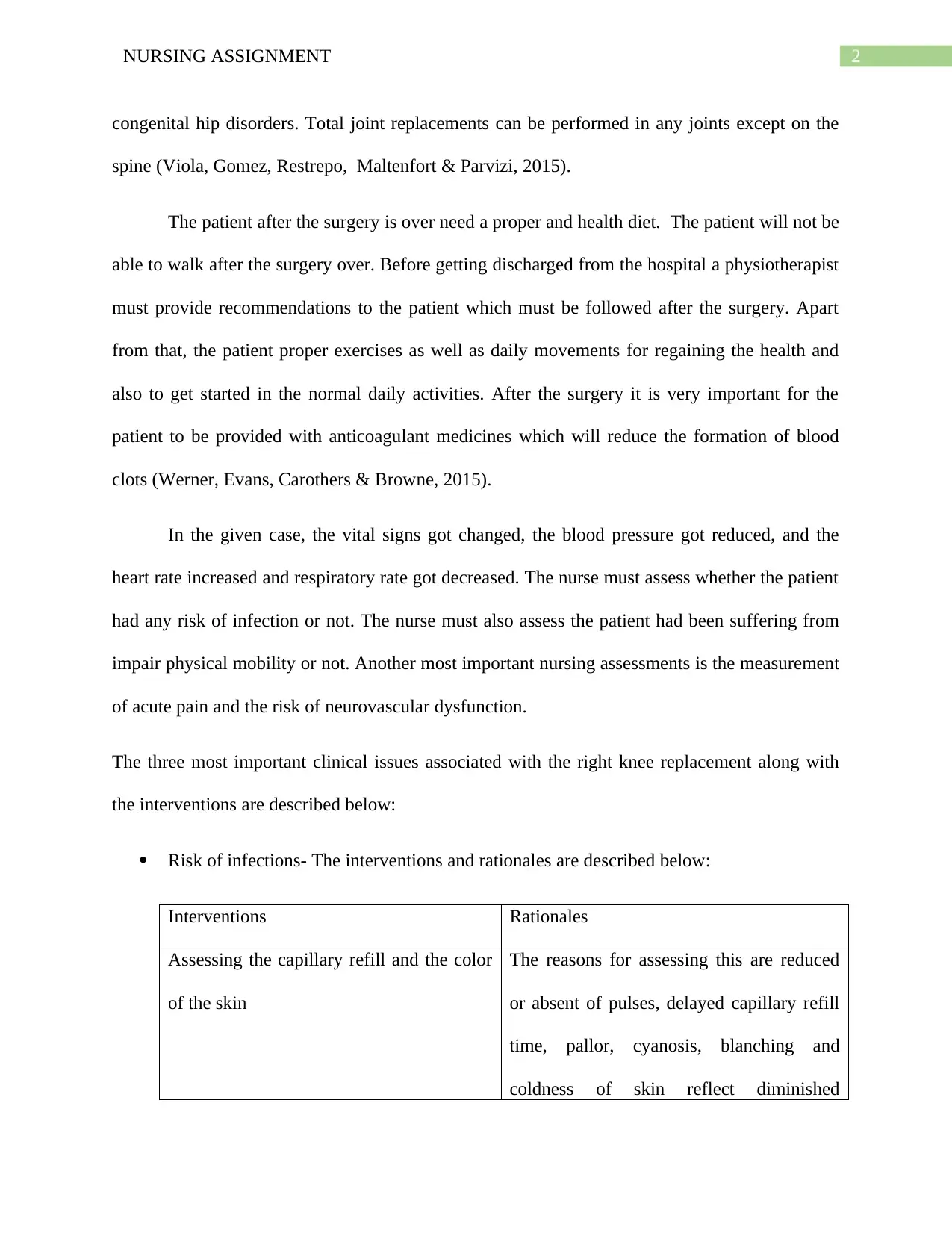
2NURSING ASSIGNMENT
congenital hip disorders. Total joint replacements can be performed in any joints except on the
spine (Viola, Gomez, Restrepo, Maltenfort & Parvizi, 2015).
The patient after the surgery is over need a proper and health diet. The patient will not be
able to walk after the surgery over. Before getting discharged from the hospital a physiotherapist
must provide recommendations to the patient which must be followed after the surgery. Apart
from that, the patient proper exercises as well as daily movements for regaining the health and
also to get started in the normal daily activities. After the surgery it is very important for the
patient to be provided with anticoagulant medicines which will reduce the formation of blood
clots (Werner, Evans, Carothers & Browne, 2015).
In the given case, the vital signs got changed, the blood pressure got reduced, and the
heart rate increased and respiratory rate got decreased. The nurse must assess whether the patient
had any risk of infection or not. The nurse must also assess the patient had been suffering from
impair physical mobility or not. Another most important nursing assessments is the measurement
of acute pain and the risk of neurovascular dysfunction.
The three most important clinical issues associated with the right knee replacement along with
the interventions are described below:
Risk of infections- The interventions and rationales are described below:
Interventions Rationales
Assessing the capillary refill and the color
of the skin
The reasons for assessing this are reduced
or absent of pulses, delayed capillary refill
time, pallor, cyanosis, blanching and
coldness of skin reflect diminished
congenital hip disorders. Total joint replacements can be performed in any joints except on the
spine (Viola, Gomez, Restrepo, Maltenfort & Parvizi, 2015).
The patient after the surgery is over need a proper and health diet. The patient will not be
able to walk after the surgery over. Before getting discharged from the hospital a physiotherapist
must provide recommendations to the patient which must be followed after the surgery. Apart
from that, the patient proper exercises as well as daily movements for regaining the health and
also to get started in the normal daily activities. After the surgery it is very important for the
patient to be provided with anticoagulant medicines which will reduce the formation of blood
clots (Werner, Evans, Carothers & Browne, 2015).
In the given case, the vital signs got changed, the blood pressure got reduced, and the
heart rate increased and respiratory rate got decreased. The nurse must assess whether the patient
had any risk of infection or not. The nurse must also assess the patient had been suffering from
impair physical mobility or not. Another most important nursing assessments is the measurement
of acute pain and the risk of neurovascular dysfunction.
The three most important clinical issues associated with the right knee replacement along with
the interventions are described below:
Risk of infections- The interventions and rationales are described below:
Interventions Rationales
Assessing the capillary refill and the color
of the skin
The reasons for assessing this are reduced
or absent of pulses, delayed capillary refill
time, pallor, cyanosis, blanching and
coldness of skin reflect diminished
⊘ This is a preview!⊘
Do you want full access?
Subscribe today to unlock all pages.

Trusted by 1+ million students worldwide
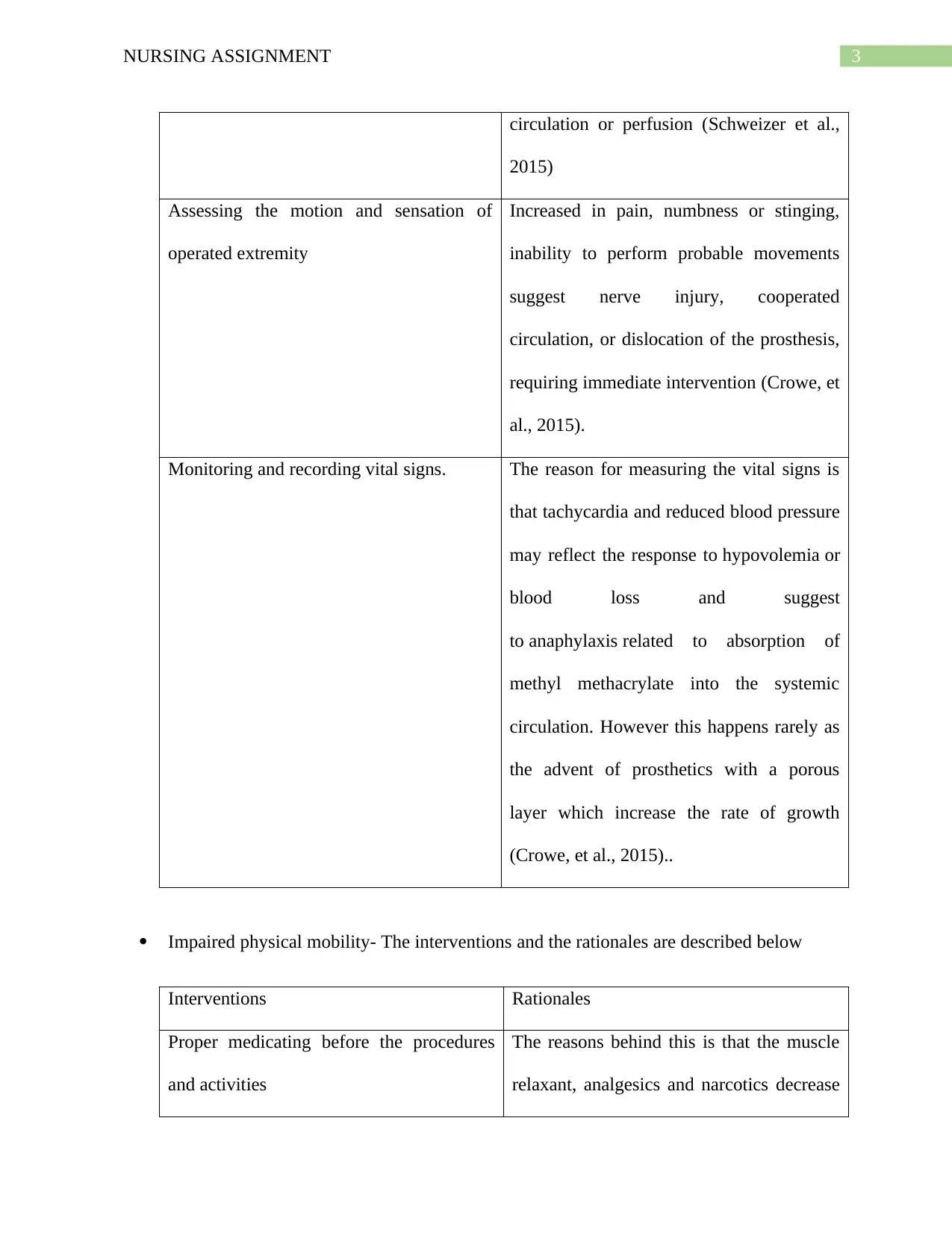
3NURSING ASSIGNMENT
circulation or perfusion (Schweizer et al.,
2015)
Assessing the motion and sensation of
operated extremity
Increased in pain, numbness or stinging,
inability to perform probable movements
suggest nerve injury, cooperated
circulation, or dislocation of the prosthesis,
requiring immediate intervention (Crowe, et
al., 2015).
Monitoring and recording vital signs. The reason for measuring the vital signs is
that tachycardia and reduced blood pressure
may reflect the response to hypovolemia or
blood loss and suggest
to anaphylaxis related to absorption of
methyl methacrylate into the systemic
circulation. However this happens rarely as
the advent of prosthetics with a porous
layer which increase the rate of growth
(Crowe, et al., 2015)..
Impaired physical mobility- The interventions and the rationales are described below
Interventions Rationales
Proper medicating before the procedures
and activities
The reasons behind this is that the muscle
relaxant, analgesics and narcotics decrease
circulation or perfusion (Schweizer et al.,
2015)
Assessing the motion and sensation of
operated extremity
Increased in pain, numbness or stinging,
inability to perform probable movements
suggest nerve injury, cooperated
circulation, or dislocation of the prosthesis,
requiring immediate intervention (Crowe, et
al., 2015).
Monitoring and recording vital signs. The reason for measuring the vital signs is
that tachycardia and reduced blood pressure
may reflect the response to hypovolemia or
blood loss and suggest
to anaphylaxis related to absorption of
methyl methacrylate into the systemic
circulation. However this happens rarely as
the advent of prosthetics with a porous
layer which increase the rate of growth
(Crowe, et al., 2015)..
Impaired physical mobility- The interventions and the rationales are described below
Interventions Rationales
Proper medicating before the procedures
and activities
The reasons behind this is that the muscle
relaxant, analgesics and narcotics decrease
Paraphrase This Document
Need a fresh take? Get an instant paraphrase of this document with our AI Paraphraser
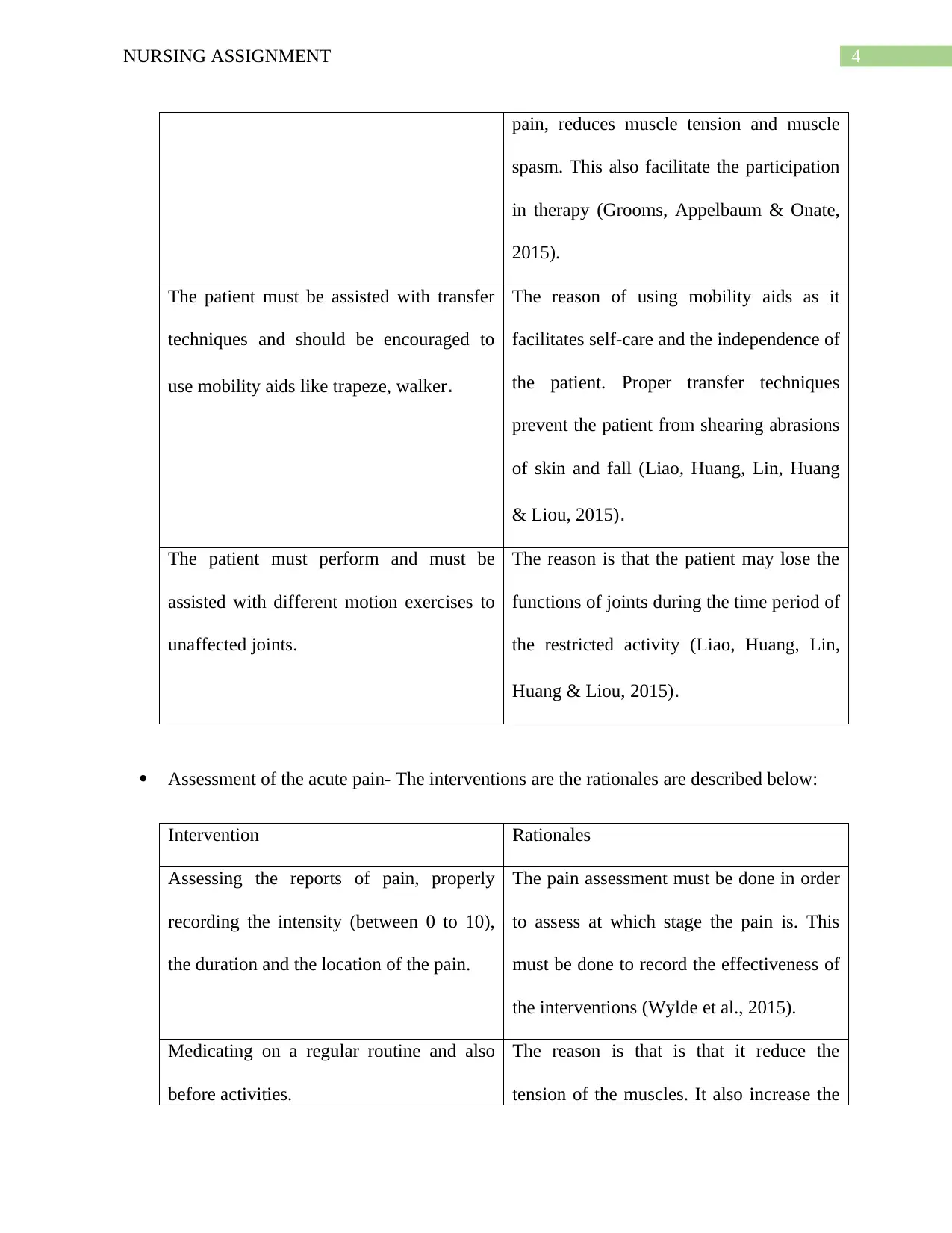
4NURSING ASSIGNMENT
pain, reduces muscle tension and muscle
spasm. This also facilitate the participation
in therapy (Grooms, Appelbaum & Onate,
2015).
The patient must be assisted with transfer
techniques and should be encouraged to
use mobility aids like trapeze, walker.
The reason of using mobility aids as it
facilitates self-care and the independence of
the patient. Proper transfer techniques
prevent the patient from shearing abrasions
of skin and fall (Liao, Huang, Lin, Huang
& Liou, 2015).
The patient must perform and must be
assisted with different motion exercises to
unaffected joints.
The reason is that the patient may lose the
functions of joints during the time period of
the restricted activity (Liao, Huang, Lin,
Huang & Liou, 2015).
Assessment of the acute pain- The interventions are the rationales are described below:
Intervention Rationales
Assessing the reports of pain, properly
recording the intensity (between 0 to 10),
the duration and the location of the pain.
The pain assessment must be done in order
to assess at which stage the pain is. This
must be done to record the effectiveness of
the interventions (Wylde et al., 2015).
Medicating on a regular routine and also
before activities.
The reason is that is that it reduce the
tension of the muscles. It also increase the
pain, reduces muscle tension and muscle
spasm. This also facilitate the participation
in therapy (Grooms, Appelbaum & Onate,
2015).
The patient must be assisted with transfer
techniques and should be encouraged to
use mobility aids like trapeze, walker.
The reason of using mobility aids as it
facilitates self-care and the independence of
the patient. Proper transfer techniques
prevent the patient from shearing abrasions
of skin and fall (Liao, Huang, Lin, Huang
& Liou, 2015).
The patient must perform and must be
assisted with different motion exercises to
unaffected joints.
The reason is that the patient may lose the
functions of joints during the time period of
the restricted activity (Liao, Huang, Lin,
Huang & Liou, 2015).
Assessment of the acute pain- The interventions are the rationales are described below:
Intervention Rationales
Assessing the reports of pain, properly
recording the intensity (between 0 to 10),
the duration and the location of the pain.
The pain assessment must be done in order
to assess at which stage the pain is. This
must be done to record the effectiveness of
the interventions (Wylde et al., 2015).
Medicating on a regular routine and also
before activities.
The reason is that is that it reduce the
tension of the muscles. It also increase the
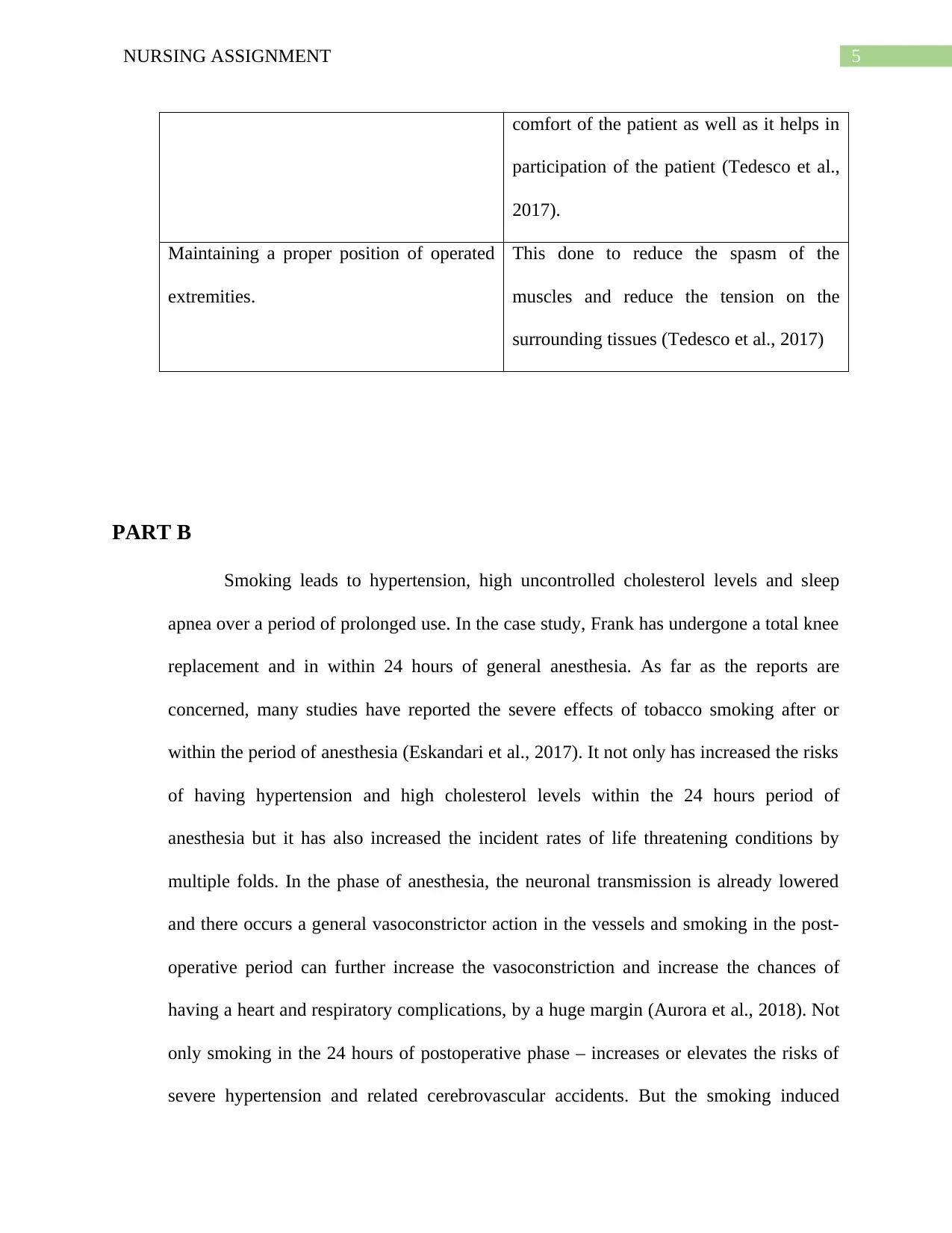
5NURSING ASSIGNMENT
comfort of the patient as well as it helps in
participation of the patient (Tedesco et al.,
2017).
Maintaining a proper position of operated
extremities.
This done to reduce the spasm of the
muscles and reduce the tension on the
surrounding tissues (Tedesco et al., 2017)
PART B
Smoking leads to hypertension, high uncontrolled cholesterol levels and sleep
apnea over a period of prolonged use. In the case study, Frank has undergone a total knee
replacement and in within 24 hours of general anesthesia. As far as the reports are
concerned, many studies have reported the severe effects of tobacco smoking after or
within the period of anesthesia (Eskandari et al., 2017). It not only has increased the risks
of having hypertension and high cholesterol levels within the 24 hours period of
anesthesia but it has also increased the incident rates of life threatening conditions by
multiple folds. In the phase of anesthesia, the neuronal transmission is already lowered
and there occurs a general vasoconstrictor action in the vessels and smoking in the post-
operative period can further increase the vasoconstriction and increase the chances of
having a heart and respiratory complications, by a huge margin (Aurora et al., 2018). Not
only smoking in the 24 hours of postoperative phase – increases or elevates the risks of
severe hypertension and related cerebrovascular accidents. But the smoking induced
comfort of the patient as well as it helps in
participation of the patient (Tedesco et al.,
2017).
Maintaining a proper position of operated
extremities.
This done to reduce the spasm of the
muscles and reduce the tension on the
surrounding tissues (Tedesco et al., 2017)
PART B
Smoking leads to hypertension, high uncontrolled cholesterol levels and sleep
apnea over a period of prolonged use. In the case study, Frank has undergone a total knee
replacement and in within 24 hours of general anesthesia. As far as the reports are
concerned, many studies have reported the severe effects of tobacco smoking after or
within the period of anesthesia (Eskandari et al., 2017). It not only has increased the risks
of having hypertension and high cholesterol levels within the 24 hours period of
anesthesia but it has also increased the incident rates of life threatening conditions by
multiple folds. In the phase of anesthesia, the neuronal transmission is already lowered
and there occurs a general vasoconstrictor action in the vessels and smoking in the post-
operative period can further increase the vasoconstriction and increase the chances of
having a heart and respiratory complications, by a huge margin (Aurora et al., 2018). Not
only smoking in the 24 hours of postoperative phase – increases or elevates the risks of
severe hypertension and related cerebrovascular accidents. But the smoking induced
⊘ This is a preview!⊘
Do you want full access?
Subscribe today to unlock all pages.

Trusted by 1+ million students worldwide
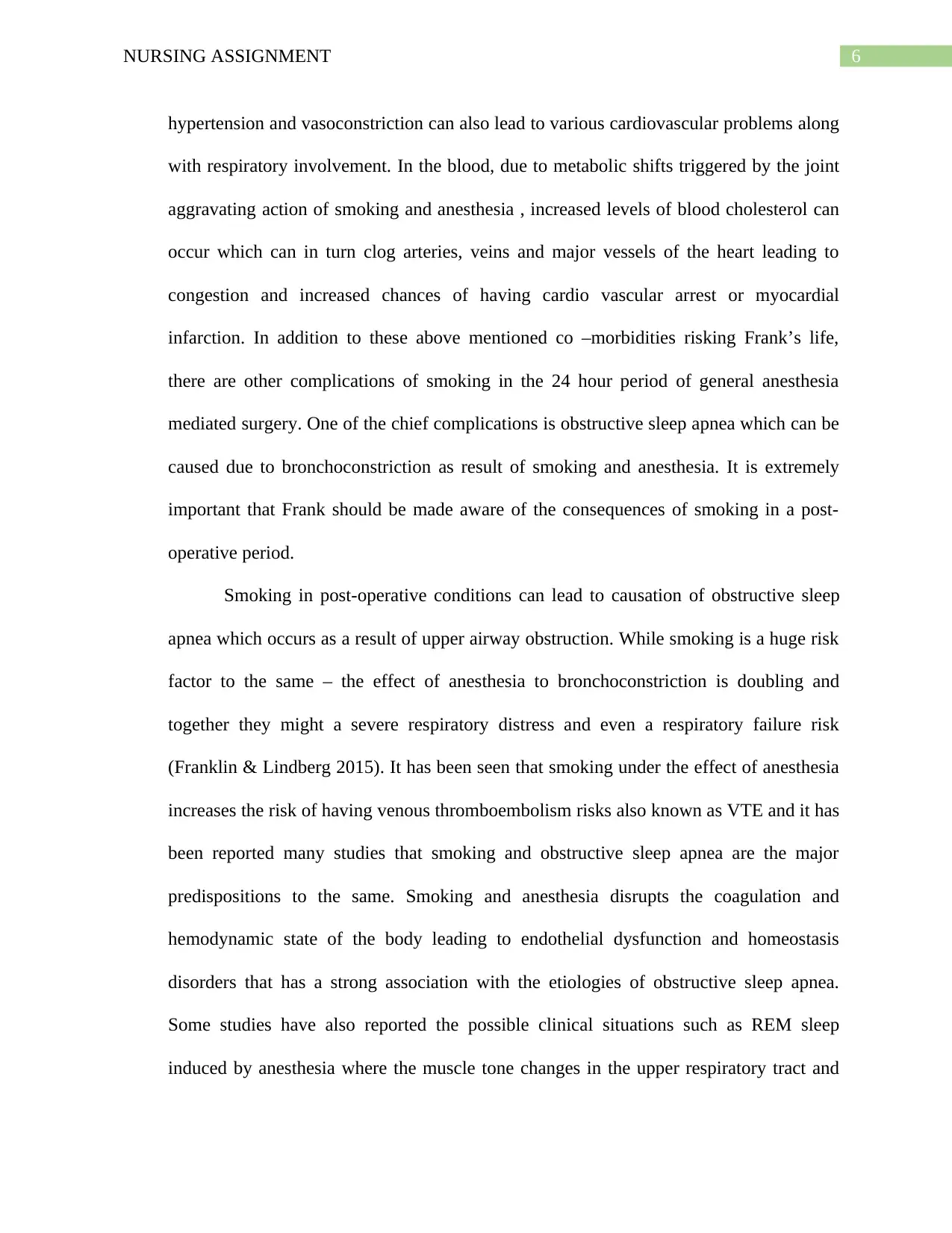
6NURSING ASSIGNMENT
hypertension and vasoconstriction can also lead to various cardiovascular problems along
with respiratory involvement. In the blood, due to metabolic shifts triggered by the joint
aggravating action of smoking and anesthesia , increased levels of blood cholesterol can
occur which can in turn clog arteries, veins and major vessels of the heart leading to
congestion and increased chances of having cardio vascular arrest or myocardial
infarction. In addition to these above mentioned co –morbidities risking Frank’s life,
there are other complications of smoking in the 24 hour period of general anesthesia
mediated surgery. One of the chief complications is obstructive sleep apnea which can be
caused due to bronchoconstriction as result of smoking and anesthesia. It is extremely
important that Frank should be made aware of the consequences of smoking in a post-
operative period.
Smoking in post-operative conditions can lead to causation of obstructive sleep
apnea which occurs as a result of upper airway obstruction. While smoking is a huge risk
factor to the same – the effect of anesthesia to bronchoconstriction is doubling and
together they might a severe respiratory distress and even a respiratory failure risk
(Franklin & Lindberg 2015). It has been seen that smoking under the effect of anesthesia
increases the risk of having venous thromboembolism risks also known as VTE and it has
been reported many studies that smoking and obstructive sleep apnea are the major
predispositions to the same. Smoking and anesthesia disrupts the coagulation and
hemodynamic state of the body leading to endothelial dysfunction and homeostasis
disorders that has a strong association with the etiologies of obstructive sleep apnea.
Some studies have also reported the possible clinical situations such as REM sleep
induced by anesthesia where the muscle tone changes in the upper respiratory tract and
hypertension and vasoconstriction can also lead to various cardiovascular problems along
with respiratory involvement. In the blood, due to metabolic shifts triggered by the joint
aggravating action of smoking and anesthesia , increased levels of blood cholesterol can
occur which can in turn clog arteries, veins and major vessels of the heart leading to
congestion and increased chances of having cardio vascular arrest or myocardial
infarction. In addition to these above mentioned co –morbidities risking Frank’s life,
there are other complications of smoking in the 24 hour period of general anesthesia
mediated surgery. One of the chief complications is obstructive sleep apnea which can be
caused due to bronchoconstriction as result of smoking and anesthesia. It is extremely
important that Frank should be made aware of the consequences of smoking in a post-
operative period.
Smoking in post-operative conditions can lead to causation of obstructive sleep
apnea which occurs as a result of upper airway obstruction. While smoking is a huge risk
factor to the same – the effect of anesthesia to bronchoconstriction is doubling and
together they might a severe respiratory distress and even a respiratory failure risk
(Franklin & Lindberg 2015). It has been seen that smoking under the effect of anesthesia
increases the risk of having venous thromboembolism risks also known as VTE and it has
been reported many studies that smoking and obstructive sleep apnea are the major
predispositions to the same. Smoking and anesthesia disrupts the coagulation and
hemodynamic state of the body leading to endothelial dysfunction and homeostasis
disorders that has a strong association with the etiologies of obstructive sleep apnea.
Some studies have also reported the possible clinical situations such as REM sleep
induced by anesthesia where the muscle tone changes in the upper respiratory tract and
Paraphrase This Document
Need a fresh take? Get an instant paraphrase of this document with our AI Paraphraser
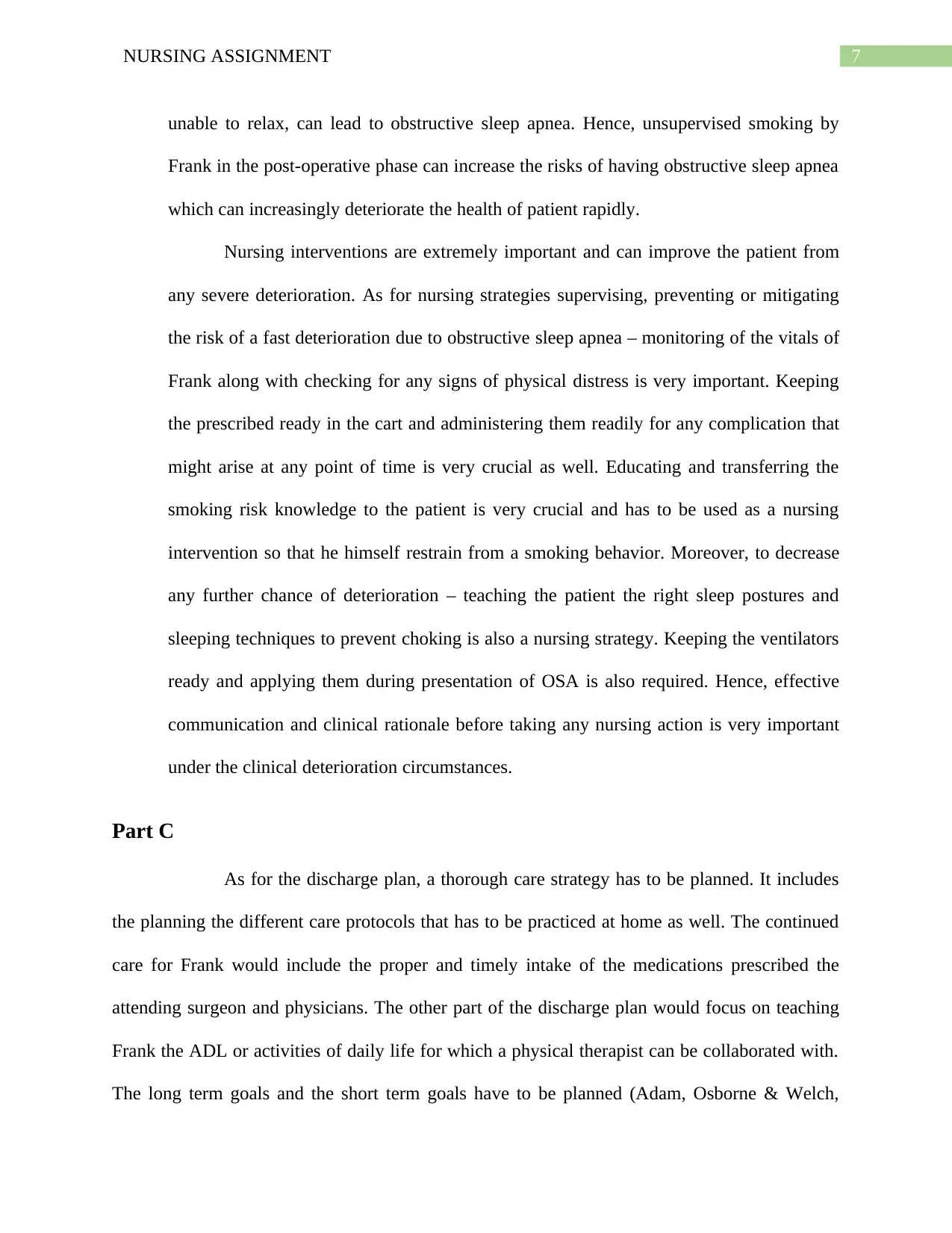
7NURSING ASSIGNMENT
unable to relax, can lead to obstructive sleep apnea. Hence, unsupervised smoking by
Frank in the post-operative phase can increase the risks of having obstructive sleep apnea
which can increasingly deteriorate the health of patient rapidly.
Nursing interventions are extremely important and can improve the patient from
any severe deterioration. As for nursing strategies supervising, preventing or mitigating
the risk of a fast deterioration due to obstructive sleep apnea – monitoring of the vitals of
Frank along with checking for any signs of physical distress is very important. Keeping
the prescribed ready in the cart and administering them readily for any complication that
might arise at any point of time is very crucial as well. Educating and transferring the
smoking risk knowledge to the patient is very crucial and has to be used as a nursing
intervention so that he himself restrain from a smoking behavior. Moreover, to decrease
any further chance of deterioration – teaching the patient the right sleep postures and
sleeping techniques to prevent choking is also a nursing strategy. Keeping the ventilators
ready and applying them during presentation of OSA is also required. Hence, effective
communication and clinical rationale before taking any nursing action is very important
under the clinical deterioration circumstances.
Part C
As for the discharge plan, a thorough care strategy has to be planned. It includes
the planning the different care protocols that has to be practiced at home as well. The continued
care for Frank would include the proper and timely intake of the medications prescribed the
attending surgeon and physicians. The other part of the discharge plan would focus on teaching
Frank the ADL or activities of daily life for which a physical therapist can be collaborated with.
The long term goals and the short term goals have to be planned (Adam, Osborne & Welch,
unable to relax, can lead to obstructive sleep apnea. Hence, unsupervised smoking by
Frank in the post-operative phase can increase the risks of having obstructive sleep apnea
which can increasingly deteriorate the health of patient rapidly.
Nursing interventions are extremely important and can improve the patient from
any severe deterioration. As for nursing strategies supervising, preventing or mitigating
the risk of a fast deterioration due to obstructive sleep apnea – monitoring of the vitals of
Frank along with checking for any signs of physical distress is very important. Keeping
the prescribed ready in the cart and administering them readily for any complication that
might arise at any point of time is very crucial as well. Educating and transferring the
smoking risk knowledge to the patient is very crucial and has to be used as a nursing
intervention so that he himself restrain from a smoking behavior. Moreover, to decrease
any further chance of deterioration – teaching the patient the right sleep postures and
sleeping techniques to prevent choking is also a nursing strategy. Keeping the ventilators
ready and applying them during presentation of OSA is also required. Hence, effective
communication and clinical rationale before taking any nursing action is very important
under the clinical deterioration circumstances.
Part C
As for the discharge plan, a thorough care strategy has to be planned. It includes
the planning the different care protocols that has to be practiced at home as well. The continued
care for Frank would include the proper and timely intake of the medications prescribed the
attending surgeon and physicians. The other part of the discharge plan would focus on teaching
Frank the ADL or activities of daily life for which a physical therapist can be collaborated with.
The long term goals and the short term goals have to be planned (Adam, Osborne & Welch,
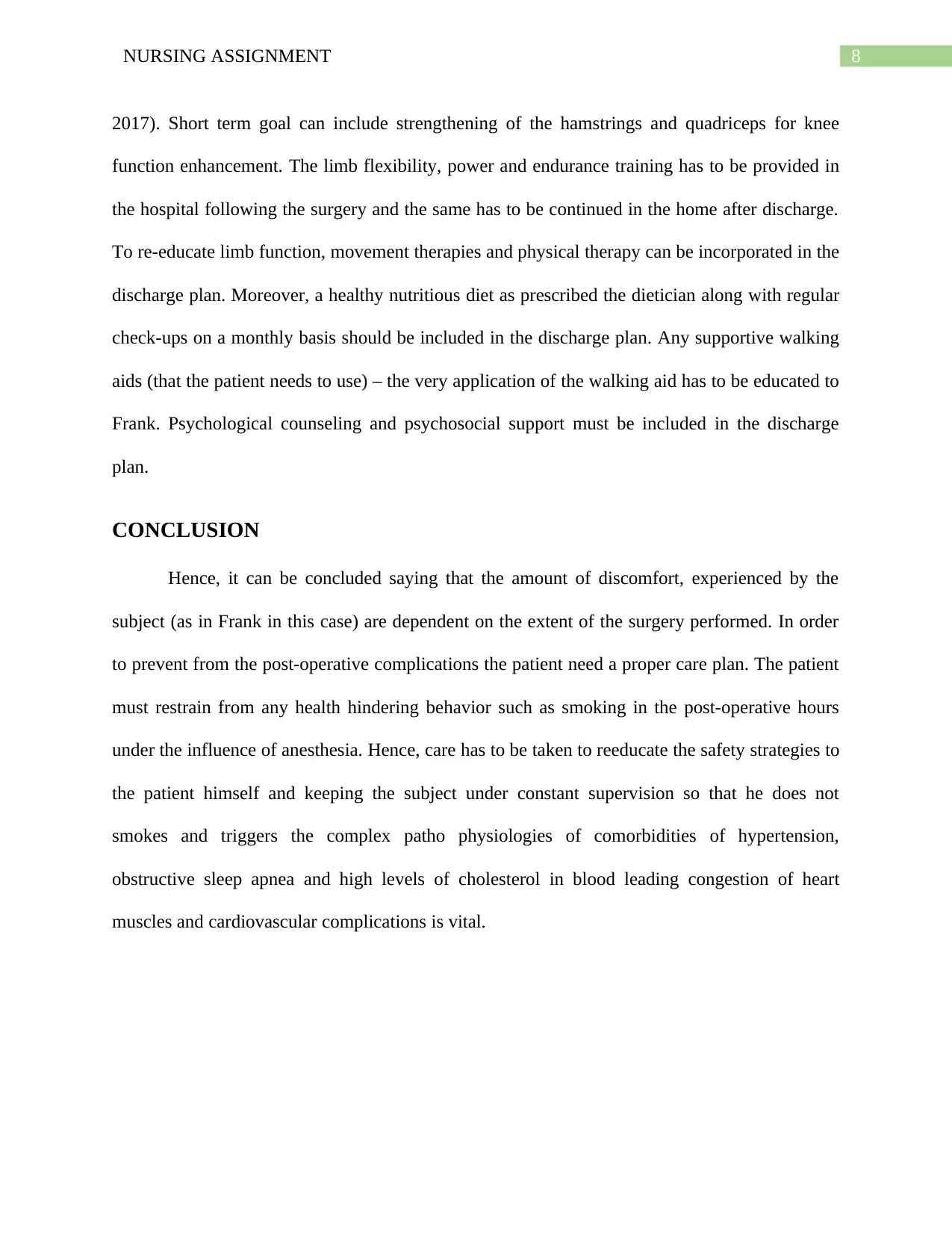
8NURSING ASSIGNMENT
2017). Short term goal can include strengthening of the hamstrings and quadriceps for knee
function enhancement. The limb flexibility, power and endurance training has to be provided in
the hospital following the surgery and the same has to be continued in the home after discharge.
To re-educate limb function, movement therapies and physical therapy can be incorporated in the
discharge plan. Moreover, a healthy nutritious diet as prescribed the dietician along with regular
check-ups on a monthly basis should be included in the discharge plan. Any supportive walking
aids (that the patient needs to use) – the very application of the walking aid has to be educated to
Frank. Psychological counseling and psychosocial support must be included in the discharge
plan.
CONCLUSION
Hence, it can be concluded saying that the amount of discomfort, experienced by the
subject (as in Frank in this case) are dependent on the extent of the surgery performed. In order
to prevent from the post-operative complications the patient need a proper care plan. The patient
must restrain from any health hindering behavior such as smoking in the post-operative hours
under the influence of anesthesia. Hence, care has to be taken to reeducate the safety strategies to
the patient himself and keeping the subject under constant supervision so that he does not
smokes and triggers the complex patho physiologies of comorbidities of hypertension,
obstructive sleep apnea and high levels of cholesterol in blood leading congestion of heart
muscles and cardiovascular complications is vital.
2017). Short term goal can include strengthening of the hamstrings and quadriceps for knee
function enhancement. The limb flexibility, power and endurance training has to be provided in
the hospital following the surgery and the same has to be continued in the home after discharge.
To re-educate limb function, movement therapies and physical therapy can be incorporated in the
discharge plan. Moreover, a healthy nutritious diet as prescribed the dietician along with regular
check-ups on a monthly basis should be included in the discharge plan. Any supportive walking
aids (that the patient needs to use) – the very application of the walking aid has to be educated to
Frank. Psychological counseling and psychosocial support must be included in the discharge
plan.
CONCLUSION
Hence, it can be concluded saying that the amount of discomfort, experienced by the
subject (as in Frank in this case) are dependent on the extent of the surgery performed. In order
to prevent from the post-operative complications the patient need a proper care plan. The patient
must restrain from any health hindering behavior such as smoking in the post-operative hours
under the influence of anesthesia. Hence, care has to be taken to reeducate the safety strategies to
the patient himself and keeping the subject under constant supervision so that he does not
smokes and triggers the complex patho physiologies of comorbidities of hypertension,
obstructive sleep apnea and high levels of cholesterol in blood leading congestion of heart
muscles and cardiovascular complications is vital.
⊘ This is a preview!⊘
Do you want full access?
Subscribe today to unlock all pages.

Trusted by 1+ million students worldwide
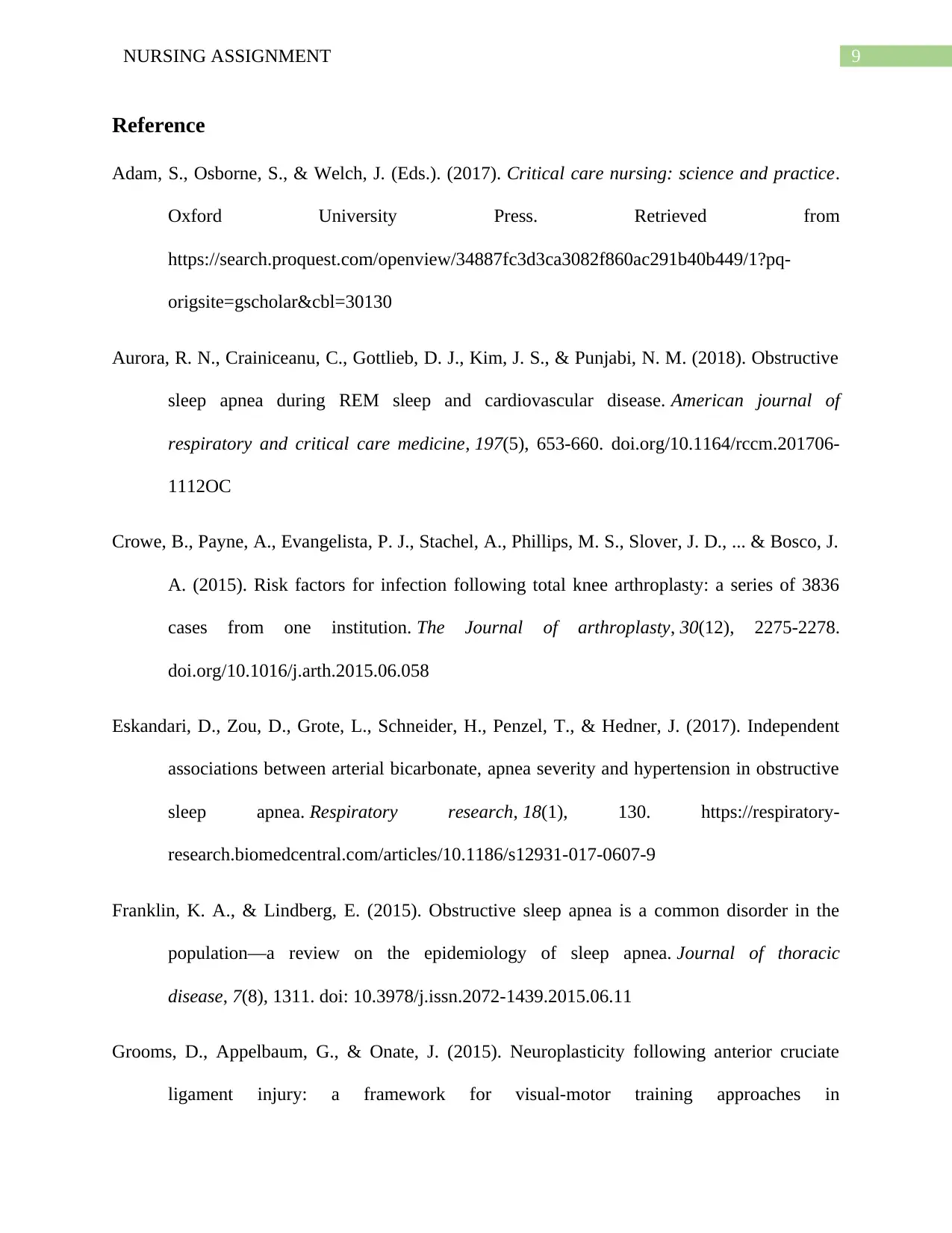
9NURSING ASSIGNMENT
Reference
Adam, S., Osborne, S., & Welch, J. (Eds.). (2017). Critical care nursing: science and practice.
Oxford University Press. Retrieved from
https://search.proquest.com/openview/34887fc3d3ca3082f860ac291b40b449/1?pq-
origsite=gscholar&cbl=30130
Aurora, R. N., Crainiceanu, C., Gottlieb, D. J., Kim, J. S., & Punjabi, N. M. (2018). Obstructive
sleep apnea during REM sleep and cardiovascular disease. American journal of
respiratory and critical care medicine, 197(5), 653-660. doi.org/10.1164/rccm.201706-
1112OC
Crowe, B., Payne, A., Evangelista, P. J., Stachel, A., Phillips, M. S., Slover, J. D., ... & Bosco, J.
A. (2015). Risk factors for infection following total knee arthroplasty: a series of 3836
cases from one institution. The Journal of arthroplasty, 30(12), 2275-2278.
doi.org/10.1016/j.arth.2015.06.058
Eskandari, D., Zou, D., Grote, L., Schneider, H., Penzel, T., & Hedner, J. (2017). Independent
associations between arterial bicarbonate, apnea severity and hypertension in obstructive
sleep apnea. Respiratory research, 18(1), 130. https://respiratory-
research.biomedcentral.com/articles/10.1186/s12931-017-0607-9
Franklin, K. A., & Lindberg, E. (2015). Obstructive sleep apnea is a common disorder in the
population—a review on the epidemiology of sleep apnea. Journal of thoracic
disease, 7(8), 1311. doi: 10.3978/j.issn.2072-1439.2015.06.11
Grooms, D., Appelbaum, G., & Onate, J. (2015). Neuroplasticity following anterior cruciate
ligament injury: a framework for visual-motor training approaches in
Reference
Adam, S., Osborne, S., & Welch, J. (Eds.). (2017). Critical care nursing: science and practice.
Oxford University Press. Retrieved from
https://search.proquest.com/openview/34887fc3d3ca3082f860ac291b40b449/1?pq-
origsite=gscholar&cbl=30130
Aurora, R. N., Crainiceanu, C., Gottlieb, D. J., Kim, J. S., & Punjabi, N. M. (2018). Obstructive
sleep apnea during REM sleep and cardiovascular disease. American journal of
respiratory and critical care medicine, 197(5), 653-660. doi.org/10.1164/rccm.201706-
1112OC
Crowe, B., Payne, A., Evangelista, P. J., Stachel, A., Phillips, M. S., Slover, J. D., ... & Bosco, J.
A. (2015). Risk factors for infection following total knee arthroplasty: a series of 3836
cases from one institution. The Journal of arthroplasty, 30(12), 2275-2278.
doi.org/10.1016/j.arth.2015.06.058
Eskandari, D., Zou, D., Grote, L., Schneider, H., Penzel, T., & Hedner, J. (2017). Independent
associations between arterial bicarbonate, apnea severity and hypertension in obstructive
sleep apnea. Respiratory research, 18(1), 130. https://respiratory-
research.biomedcentral.com/articles/10.1186/s12931-017-0607-9
Franklin, K. A., & Lindberg, E. (2015). Obstructive sleep apnea is a common disorder in the
population—a review on the epidemiology of sleep apnea. Journal of thoracic
disease, 7(8), 1311. doi: 10.3978/j.issn.2072-1439.2015.06.11
Grooms, D., Appelbaum, G., & Onate, J. (2015). Neuroplasticity following anterior cruciate
ligament injury: a framework for visual-motor training approaches in
Paraphrase This Document
Need a fresh take? Get an instant paraphrase of this document with our AI Paraphraser
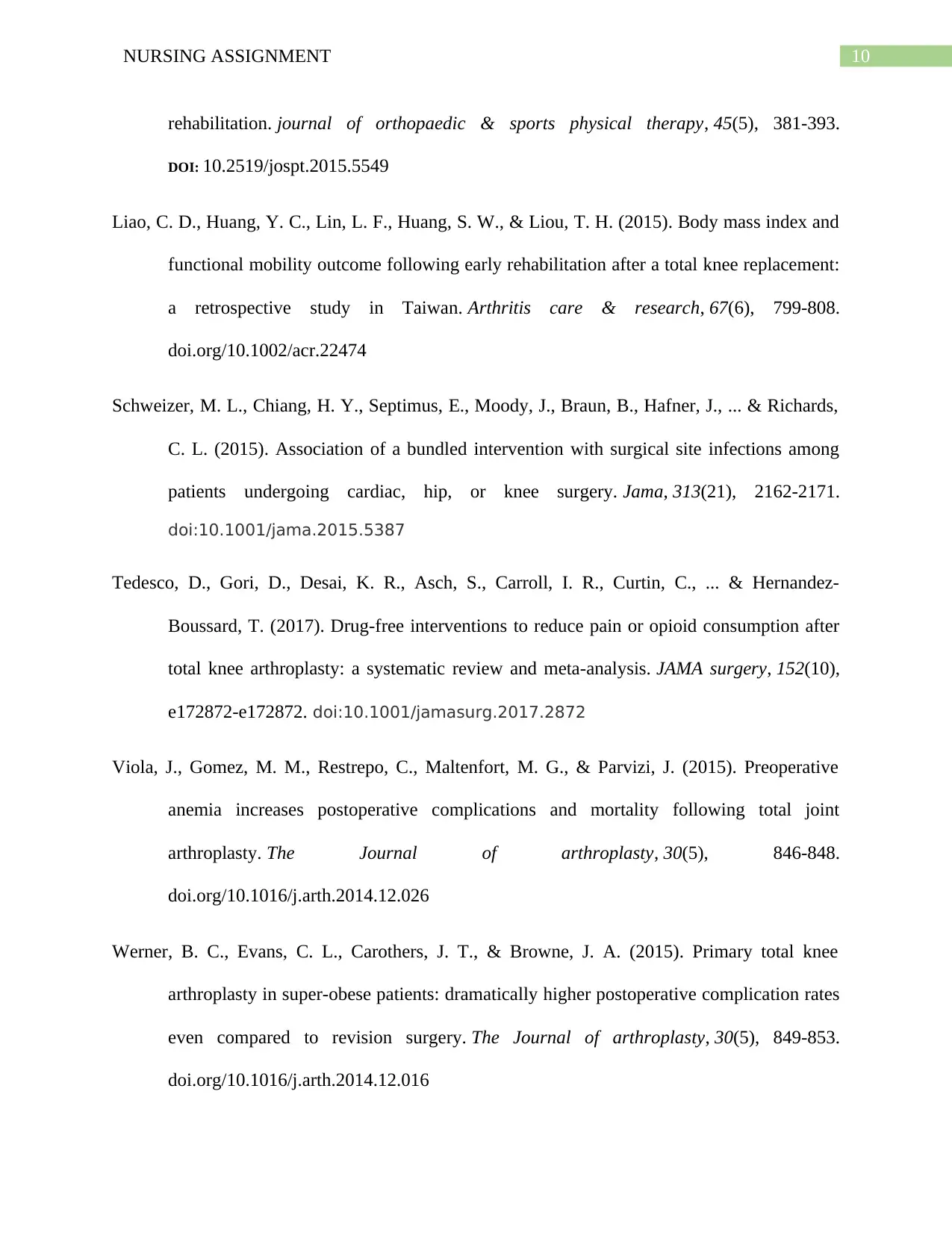
10NURSING ASSIGNMENT
rehabilitation. journal of orthopaedic & sports physical therapy, 45(5), 381-393.
DOI: 10.2519/jospt.2015.5549
Liao, C. D., Huang, Y. C., Lin, L. F., Huang, S. W., & Liou, T. H. (2015). Body mass index and
functional mobility outcome following early rehabilitation after a total knee replacement:
a retrospective study in Taiwan. Arthritis care & research, 67(6), 799-808.
doi.org/10.1002/acr.22474
Schweizer, M. L., Chiang, H. Y., Septimus, E., Moody, J., Braun, B., Hafner, J., ... & Richards,
C. L. (2015). Association of a bundled intervention with surgical site infections among
patients undergoing cardiac, hip, or knee surgery. Jama, 313(21), 2162-2171.
doi:10.1001/jama.2015.5387
Tedesco, D., Gori, D., Desai, K. R., Asch, S., Carroll, I. R., Curtin, C., ... & Hernandez-
Boussard, T. (2017). Drug-free interventions to reduce pain or opioid consumption after
total knee arthroplasty: a systematic review and meta-analysis. JAMA surgery, 152(10),
e172872-e172872. doi:10.1001/jamasurg.2017.2872
Viola, J., Gomez, M. M., Restrepo, C., Maltenfort, M. G., & Parvizi, J. (2015). Preoperative
anemia increases postoperative complications and mortality following total joint
arthroplasty. The Journal of arthroplasty, 30(5), 846-848.
doi.org/10.1016/j.arth.2014.12.026
Werner, B. C., Evans, C. L., Carothers, J. T., & Browne, J. A. (2015). Primary total knee
arthroplasty in super-obese patients: dramatically higher postoperative complication rates
even compared to revision surgery. The Journal of arthroplasty, 30(5), 849-853.
doi.org/10.1016/j.arth.2014.12.016
rehabilitation. journal of orthopaedic & sports physical therapy, 45(5), 381-393.
DOI: 10.2519/jospt.2015.5549
Liao, C. D., Huang, Y. C., Lin, L. F., Huang, S. W., & Liou, T. H. (2015). Body mass index and
functional mobility outcome following early rehabilitation after a total knee replacement:
a retrospective study in Taiwan. Arthritis care & research, 67(6), 799-808.
doi.org/10.1002/acr.22474
Schweizer, M. L., Chiang, H. Y., Septimus, E., Moody, J., Braun, B., Hafner, J., ... & Richards,
C. L. (2015). Association of a bundled intervention with surgical site infections among
patients undergoing cardiac, hip, or knee surgery. Jama, 313(21), 2162-2171.
doi:10.1001/jama.2015.5387
Tedesco, D., Gori, D., Desai, K. R., Asch, S., Carroll, I. R., Curtin, C., ... & Hernandez-
Boussard, T. (2017). Drug-free interventions to reduce pain or opioid consumption after
total knee arthroplasty: a systematic review and meta-analysis. JAMA surgery, 152(10),
e172872-e172872. doi:10.1001/jamasurg.2017.2872
Viola, J., Gomez, M. M., Restrepo, C., Maltenfort, M. G., & Parvizi, J. (2015). Preoperative
anemia increases postoperative complications and mortality following total joint
arthroplasty. The Journal of arthroplasty, 30(5), 846-848.
doi.org/10.1016/j.arth.2014.12.026
Werner, B. C., Evans, C. L., Carothers, J. T., & Browne, J. A. (2015). Primary total knee
arthroplasty in super-obese patients: dramatically higher postoperative complication rates
even compared to revision surgery. The Journal of arthroplasty, 30(5), 849-853.
doi.org/10.1016/j.arth.2014.12.016
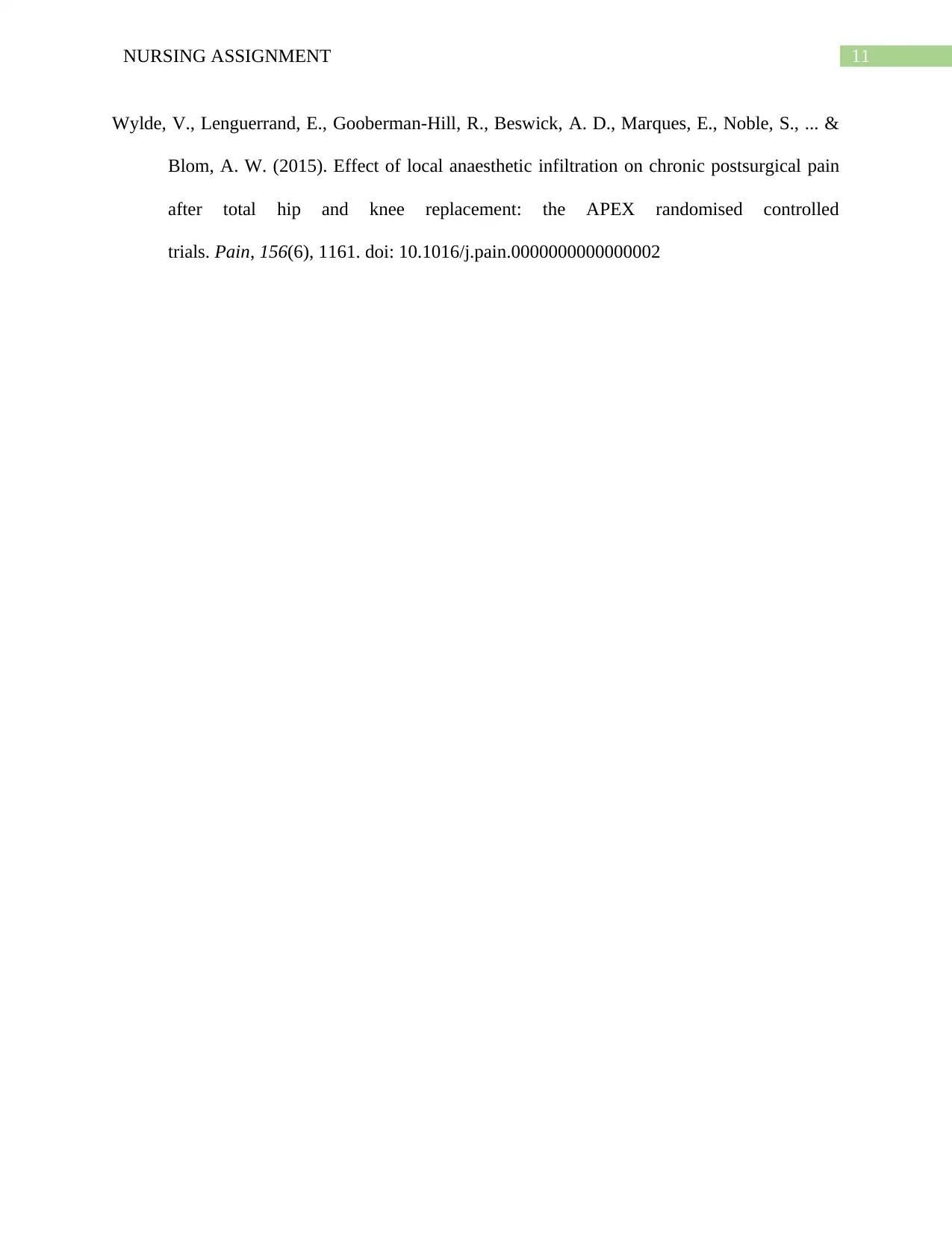
11NURSING ASSIGNMENT
Wylde, V., Lenguerrand, E., Gooberman-Hill, R., Beswick, A. D., Marques, E., Noble, S., ... &
Blom, A. W. (2015). Effect of local anaesthetic infiltration on chronic postsurgical pain
after total hip and knee replacement: the APEX randomised controlled
trials. Pain, 156(6), 1161. doi: 10.1016/j.pain.0000000000000002
Wylde, V., Lenguerrand, E., Gooberman-Hill, R., Beswick, A. D., Marques, E., Noble, S., ... &
Blom, A. W. (2015). Effect of local anaesthetic infiltration on chronic postsurgical pain
after total hip and knee replacement: the APEX randomised controlled
trials. Pain, 156(6), 1161. doi: 10.1016/j.pain.0000000000000002
⊘ This is a preview!⊘
Do you want full access?
Subscribe today to unlock all pages.

Trusted by 1+ million students worldwide
1 out of 12
Related Documents
Your All-in-One AI-Powered Toolkit for Academic Success.
+13062052269
info@desklib.com
Available 24*7 on WhatsApp / Email
![[object Object]](/_next/static/media/star-bottom.7253800d.svg)
Unlock your academic potential
Copyright © 2020–2026 A2Z Services. All Rights Reserved. Developed and managed by ZUCOL.



